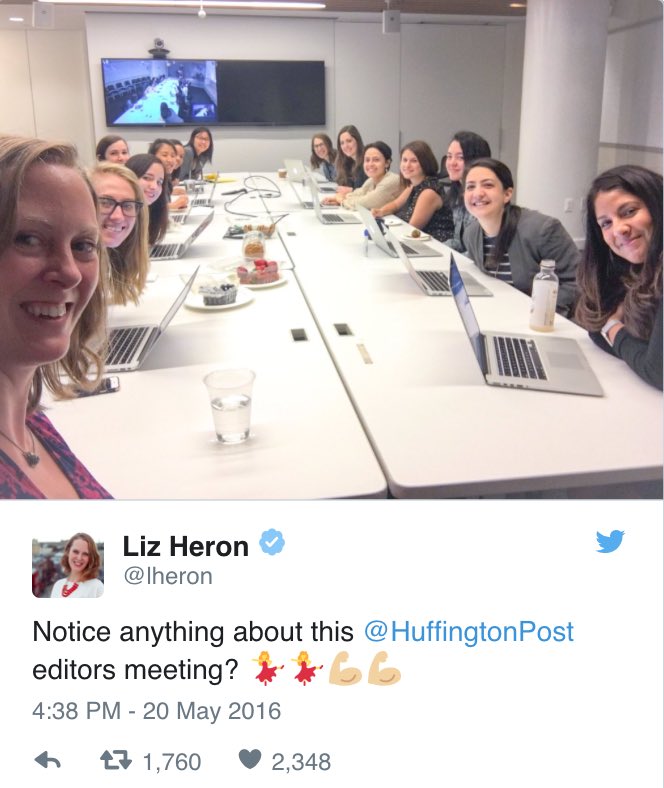Butler states that: “Race and post-feminism in the contemporary United States is troubling, particularly because it seems to indicate a continuing tendency among feminist scholars to treat race as secondary to gender despite repeated calls from feminists of color to understand race and gender as mutually constitutive.” (Butler, 2013, p.53). This rings so true because there is this constant lack of inclusivity when it comes to feminism. I can not count how many times I’ve seen articles blogs and women in entertainment praise how revolutionary and ‘feminist’ a project they are a part of is, and decide not to include women of color. For example, about a year ago Liz Heron, Huffington Post editor’s tweet from a year ago.
This tweet led to a lot of annoyance especially from women of color who felt like Heron was priding her self in how ‘feminist’ and ‘inclusive’ the editor’s office was, but of course there was one common denominator which is that none of the women were people of color. So many instances in television for example, this has occurred. Shows like Girls and Sex and the City come to mind. I would say that I do enjoy the latter due to how it did have a revolutionary portrayal of women with a character like Samantha who was in her 40s, single, sexual, working woman that absolutely, happy with who she was. However, it is troubling to have both shows which are based in New York City, one of America’s most diverse states and barely have any representation of women of color.
Butler also gives examples of women of color such as Nicki Minaj and JLo who own their sexuality and freedom to portray themselves however they want to. However, this also leads me to the criticism that a woman like Nicki Minaj would get for owning her ‘sexual’ or pornographic, thus leading to people saying that she is ‘ghetto’ or a ‘stripper’ whereas a Caucasian woman such as Britney Spears who changed her image around the early 2000s to be more sexy and empowering was seen as just that, sexy and empowering.
At the end of the day it is important for TV and society to be inclusive. Women need to stop creating this form of ‘feminism’ that does not include women of color. It has gotten better over the years for sure however, there is still that lack of inclusivity and hypocritical judgment towards women of color that continuously remains frustrating.

There are a few Asian-Americans in the photo and possibly a Latinx...
ReplyDeleteBut I feel you on the ''feminism'' on 'Girls' and 'Sex and the City'. I could also rant about my hatred for Lena Dunham, but that's for another time.
Actually you are right. I didn't even notice because they are so far back. Oops.
DeleteOh boy Lena Dunham is truly just the most confusing thing ever.
What is so tough for me to figure out when trying to dissect the work of Nicki Minaj is how much control she had in the creation of her work. It's interesting how subjective and context-based feminism is. If Nicki had no creative say in her music video (and since it was produced and directed my males), can we claim it as feminist, or as a satire of post-feminism? Just because academics can deconstruct the piece and find aspects that are feminist does not mean that was the intention of the people who created the music video. Did Nicki have these ideas in mind while singing and acting in the piece? Is sexual subjugation bad if that's what she wants? Or is it just bad if men and women watching the video see it as a way of presenting the black body as exotic and meant for only visual pleasure? Is that the video's fault or the viewer's fault? Is it the fault of the culture we are surrounded by--and if so, how can this video separate itself from that culture when it has a lot of similar aspects to what we deem sexist? I have a lot of questions.
ReplyDelete